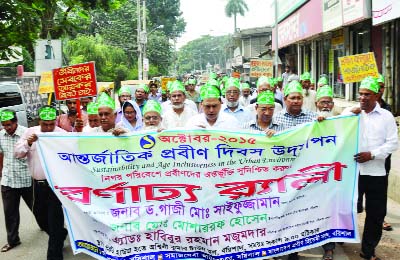
BSS, Rajshahi :Bangladesh Sericulture Development Board (BSDB) has been implementing a project for promoting sericulture and its industry through entrepreneurship development at different levels of production.According to the officials concerned, the five-year project titled”Extension and Development of Sericulture in Public and Private sector in Bangladesh” is being implemented throughout the country by spending Taka 30 crore. Side by side with the BSB, two more institutions like BangladeshSericulture Research and Training Institute (BSRTI) and Bangladesh Silk Foundation (BSF) are also working as implementing agencies.The sources said the project has provision of establishing 23 sericulture villages at the potential areas as a model to improve capacity of small and marginal farmers to establish high yielding mulberry garden and produce superior quality of silk cocoon.The villages will function as a good center for economic activity and people of the adjacent areas will gradually be inspired and involved in income generation process.Talking to BSS, Serajul Islam, Member (Extension and Motivation) of BSDB, said that the sericulture and silk industry, by its nature, is a family based labor- intensive economic activity that provides employment for the rural people.More than six lakh people are involved in this industry of which one lakh are cocoon growers and the rest are engaged in silk reeling, spinning, weaving, dyeing, printing, finishing and trading activities.The multidisciplinary activities provide unique job opportunities to the marginal farmers, landless poor, rural artisans and also the urban silk fabric manufacturing industries and contribute a lot to poverty reduction, he added.He said, there are around 80 small and medium silk factories in private sector with a capacity of manufacturing 25.50 million meters fabrics annually.Apart from this, there are about 10,000 private handlooms with capacity of producing 30 million meters silk fabric.Serajul Islam said the project has been developing suitable mulberry and silkworm varieties besides producing and supplying superior quality mulberry saplings and cuttings and silkworm eggs according to the demands of the farmers.Some six lakh mulberry saplings were raised and three thousand people were engaged in plantation and nursing of the trees within the project period, under which, 24,000 kg’s of seed cocoons will be produced.Necessary process for providing essential supports for human resource development, infrastructure development, machinery procurement and raw materials is progressing fast under the project.In addition to arrangement of training for 2,130 farmers, 330 people are being provided through improved training on reeling, weaving and dyeing and printing.Another 700 farmers, 200 reelers/spinners and 200 silk weavers are being given need-based training to improve their working efficiency in the field for improvement of rearing of mulberry trees and silkworm and reeling and weaving productivity.Need-oriented training for more than 4,000 persons is being arranged to develop design and quality of silk products that will expand its market potential at home and abroad and improve the standard of living of silk growers besides extending technical support.On successful completion by this earend, Serajul Islam expected that the project will help alleviating poverty of some 50,000 people by directly supporting them through employment generation side by side with developing 4,200 new cocoon producers who will produce at least 650 tonnes of healthy cocoons along with increasing overall silk production in the country.

